
 "Give to Caesar what is Caesar's and to God what is God's (Matthew 22:21)
"Give to Caesar what is Caesar's and to God what is God's (Matthew 22:21) in this issue First Quarter 2003, Vol. 7 No. 1
- Globalization Challenges Fundamentalist Religions
- Yemen Mourns & Missionaries Forgive
- Jordanian Widow Struggles to Keep Kids
- Dayna Curry Details God's Work in Afghanistan
- Extremists Shame Indonesian Muslims
- Book Review of The Sword of the Prophet
- Spiritual Landscape of North Korea
- CD-rom on Islam
- Special Deals for Military on Audio-Visual Materials
- Guide for Evangelism on the Web
- Help Persecuted Christians in Afghanistan
- Muslim Studies Training Programs in 2003
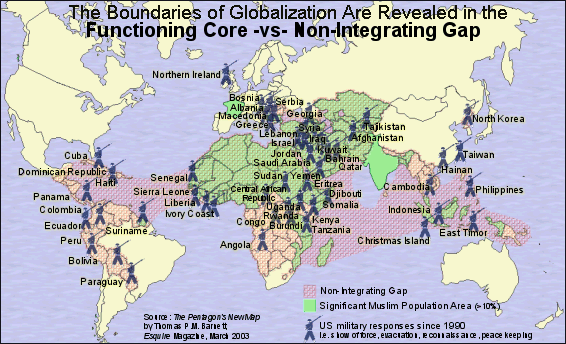
Feature:
Fundamantalist Islam Resists Globalization
by Bruce Sidebotham
According to U. S. Naval Warfare College professor, Thomas Barnett, "a global rule set of democracy, transparency, and free trade" connecting "countries together in mutually assured dependence" is emerging.
Countries following the global rules are stable. He calls them "Core." Countries not participating in globalization, called the "Gap," are plagued with repression, poverty, disease, and conflict.
Since the collapse of Soviet Communism, nearly all U. S. military actions have been in response to threats either in or exported from the Gap .
Besides blunting and blocking the Gap's drug and terrorist exports, Barnett says that shrinking the Gap with exported security and integrating it into the Core will be a global-security task to rival the Cold War. He proclaims, "Until we begin the systematic, long-term export of security to the Gap, it will increasingly export its pain to the Core in the form of terrorism and other instabilities."
Integrating Gap countries into globalization, however, entails more than exporting security and economic interdependence. Winning the Cold War took superior values, character, and ideology as much as military buildup and economic strength.
In diagnosing the Gap, Barnett blames its disconnectedness on the lack of personal freedom due to insecurity and fear. In prescribing globalization, Barnett advocates military intervention, free trade, foreign investment, human liberty, and economic interdependence.
A product of his materialistic Harvard education, Barnett avoids discussing spirituality. However, the source of the present conflict, and hence its long-term solution, is not merely economic and material. It is religious.
 The belief system that globalizes interdependent Core countries is Secularism. Historian Bernard Lewis notes the term "secularism" was first used in the nineteenth century for "the doctrine that morality should be based on rational considerations regarding human well-being in this world, to the exclusion of considerations relating to God and the after-life."
The belief system that globalizes interdependent Core countries is Secularism. Historian Bernard Lewis notes the term "secularism" was first used in the nineteenth century for "the doctrine that morality should be based on rational considerations regarding human well-being in this world, to the exclusion of considerations relating to God and the after-life."
As a governing ideology, Secularism ended Europe's bloody religious wars. It permits a plurality of religious convictions in a civil society by rendering them irrelevant to civic life. It is also compatible with the history of Christianity, which grew for three hundred years without political influence and with the teachings of Christ who said, "Give to Caesar what is Caesar's, and to God what is God's" (Matthew 22:21). Secularism, however, is not compatible with Islam.
Although it organizes no system of belief in God, Secularism proclaims about God that his supernatural revelations are irrelevant to legislating civic morality. This contradicts the Muslim notion that the state should manifest and implement Islam. Bernard Lewis points out that this notion comes from the triumph Muhammad achieved in his own lifetime. "He conquered his promised land, and created his own state, of which he himself was supreme sovereign. . . . he ruled, and the story of his decisions and actions as ruler is sanctified."
Under Secularism, people make laws and nations demand compliance and allegiance. Citizens may freely choose and express beliefs, but they will be punished for breaking laws or committing treason.
Under Islam, citizens commit treason by leaving or blaspheming Islam, and civil laws come from Allah. Cooperating with the secular rules to participate in globalization compromises Islam by subjugating the Qur'an to international human conventions. Fundamentalist Muslims in Gap countries are not just trying to return to some seventh century golden age, they are fighting for relevance of religion in a world where it matters no longer.
Consider, for example, the implications of demanding airplane bombers be tried in a secular "world court" or demanding that Iraq submit to United Nations weapons inspections. For hundreds of years, Muslims dictated the rules for international trade, boundaries, and relations, but today, secular law and governing bodies trump Muslim ones.
A nation's well-being depends on social conditions that are driven more by spiritual values than by security arrangements and physical resources. The insecurity and fear that constrain personal freedoms which could lead to global connectivity of Gap countries come from entrenched belief systems. Shrinking the Gap will be impossible without religious changes. before populations in Muslim Gap countries can be globalized with security and economic arrangements, they must be secularized.
News:
All Yeman Mourns Slain Missionaries; Family and Friends Forgive Islamist Assassin
by Barbara G. Baker in January 10, 2003 COMPASS DIRECT
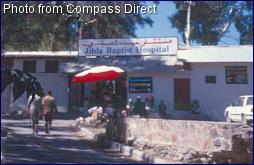 The families and colleagues of missionaries murdered at the Jibla Baptist Hospital in Yemen have sent word to the
assassin that they forgive him for what he did.
The families and colleagues of missionaries murdered at the Jibla Baptist Hospital in Yemen have sent word to the
assassin that they forgive him for what he did.
While declaring their grief over the tragic deaths, close friends on the hospital staff conveyed their message of forgiveness through an attorney to Abed Abdul Razak Kamel, the self-confessed killer, Baptist Press reported.
Dr. Martha Myers, hospital administrator William Koehn, and purchasing agent Kathleen Gariety were shot and killed by Kamel on the morning of December 30th on the hospital compound.
As quoted in the Yemeni newspaper, the captured assassin told his government interrogators, "Go ahead and kill me, since I am going to go to heaven anyway." Kamel indicated that by murdering missionaries whom he accused of converting "dozens of Muslims" to Christianity, he had insured his entrance into heaven.
The emphasis on forgiveness was woven through the funeral service the following day on the hospital compound, as well as in later memorial services in Sanaa and the United States.
On December 31st, hundreds of Yemenis from Jibla and the surrounding area gathered at the hospital to pay their respects, while others lined the road for a half-mile outside the hospital gates. Both Myers and Koehn were buried in the cemetery of the 80-bed hospital compound where they had labored for 25 years or more. Gariety's body was sent home to Wisconsin for burial.
"We feel as if we were all assassinated today," local Red Crescent official Ahmed al-Sabahi told Reuters after the murders. "All Jibla weeps for them," local resident Malka al-Hadhrami told the Associated Press at the funeral, choking back her tears.
Yemeni hospital staff and friends built the caskets for Koehn and Dr. Myers with their own hands, then dug the graves and lowered the bodies into the ground.
Within 48 hours of the shooting, most of the Southern Baptist staff of Jibla Hospital traveled north to the capital, Sanaa, "to rest, heal and regroup," Baptist Press reported. Most have indicated they plan to remain in the country, including Koehn's wife Marty, who said she wanted to stay "to encourage the Yemeni people grieving the loss of my husband."
Just before a memorial service at Sanaa's International School auditorium on January 1st, Dr. Judy Williams of the Jibla staff met with the international press.
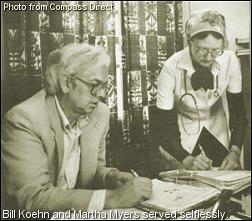 "These individuals deeply loved and cared for the people of Yemen," Williams said in a prepared statement, as
reported by the Baptist Press. "They freely chose to give their lives to serve the people of this country. And
although their lives on earth have ended, nothing was taken from them that they hadn't already freely given.
"These individuals deeply loved and cared for the people of Yemen," Williams said in a prepared statement, as
reported by the Baptist Press. "They freely chose to give their lives to serve the people of this country. And
although their lives on earth have ended, nothing was taken from them that they hadn't already freely given.
"My friends [at the hospital] want you to know that they don't hold anything against the assailant," Williams continued. "They want him to know that they forgive him, and they want him to know God's forgiveness."
At Gariety's memorial service at Layton Avenue Baptist Church in Milwaukee, Wisconsin, Pastor Keith Chase urged everyone who grieved the deaths of the three workers to pray for their killer. "We are called to love our enemies," Chase said. "It would tarnish the life and ministry of these people to allow hatred to win."
The wounded colleague who survived the attack is reported to be recovering.
Donald Caswell, 49, was transferred to the capital, Sanaa, the day after the attack, following successful surgery to remove two bullets in his abdomen. A pharmacist from Levelland, Texas, Caswell and his family have worked at the hospital for more than a year.
Yemeni authorities have arrested at least 30 suspects in connection with the Jibla murders, a security spokesman told the Agence France Press on January 1st. All known Islamist militants, the men in custody are mostly "mosque preachers from various parts of Yemen," the Yemen Times reported in its January 6th issue.
Kamel has reportedly also admitted to knowing several suspected al-Qaeda members, including the suicide bomber who attacked the USS Cole in October 2000. On January 5th, Yemeni security officials said they had found audiotapes of al-Qaeda leader Osama bin Laden in a search of Kamel's home. In remarks published the same day, Yemeni Parliament speaker Abdullah al-Ahmar said he believed the missionary shootings were in revenge for the November killing of al-Qaeda's top operative in Yemen by an unmanned CIA missile.
Kamel has claimed that he plotted his attack with Ali al-Jarallah, who assassinated Yemeni opposition politician Jarallah Omar two days before the Jibla attack. According to interrogators, the two had at least six other targets on their hit list, including other foreigners, journalists and secular politicians.
News:
Jordan Widow Fights Muslim Court for Custody of Her Children
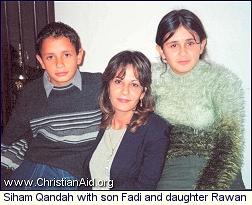 In an embarrassing case of international proportions, Jordan's Supreme Court has ruled that a Christian widow must surrender her two children to a Muslim guardian who will raise them in the Muslim faith.
In an embarrassing case of international proportions, Jordan's Supreme Court has ruled that a Christian widow must surrender her two children to a Muslim guardian who will raise them in the Muslim faith.
Siham Qandah, the widow, is the youngest of ten children. She has two sisters living in Canada and a brother who is pastoring a church in Illinois. This brother has offered full support, but Qandah's 13-year-old son, Fadi, and 15-year-old daughter, Rawan, have been forbidden to leave Jordan.
One of Qandah's brothers who converted to Islam as a teenager is a leader in a Jordanian mosque. In 1998, he filed a civil suit demanding custody of his niece and nephew in order to raise them as Muslims, claiming Qandah's husband converted to Islam before he died, so that under Jordanian law the children must be raised in Islam.
Qandah's husband died in 1994 while on military duty in Kosovo. When Qandah went to claim her benefits, authorities said she was ineligible as a Christian, because her husband converted to Islam while in Kosovo. They produced a conversion certificate dated in 1991 that was written and signed by two Muslim witnesses, but which bore only an "X" for the signature of her late husband.
To draw benefits for her children, Qandah had to name a Muslim as their legal guardian. She named the brother who now demands custody.
Qandah doubts the conversion document is genuine. Her husband attended their son's baptism between 1991 and 1994. His burial was Christian. His death certificate is Christian.
According to Jordanian law, the certificate of conversion may not be contested by a Christian woman, since it has already been certified by an Islamic court.
International media coverage and appeals from abroad to the Jordanian royal family have prevented the court order from being enforced, but on January 16th the Irbid Court of First Instance issued a warrant for Qandah's arrest.
Qandah and her children are presently hiding. Prince Hassan, brother of the late King Hussein, and Jordanian King Abdullah II are reportedly concerned but unwilling to intervene on the young widow's behalf.
News:
Dayna curry Details God'S Work in Afghanistan
Dayna Curry and Heather Mercer, who were imprisoned in Afghanistan prior to 9-11 for telling Muslims about Jesus, have been using their popularity to tell others of their love for Afghans and God's work in that land.
In her presentations, Dayna told listeners of four factors that she has seen having an impact in Afghanistan.
Radio Programs
Dayna told about meeting an Afghan woman who heard a Christian radio broadcast when she was sweeping her home. The woman told Dayna that the name of Jesus "was the sweetest sound she had heard." Since the Taliban at that time was forbidding her to tell people about Jesus, Dayna started buying radios for people.
The JESUS Film
Dayna related the story of a very poor man who came up to her and said, "What this film says is more important than all the money in the world." She says that the film is especially powerful among the poor people, many of whom have never seen a film before.
Prayer
Dayna noted that the numbers of sick and ailing in Afghanistan have been so high that it has been impossible for most to get any kind of professional medical care. Her treatment of choice was prayer. One day a worried mother approached her and Heather about one of her children who had a very high fever. The woman agreed to let Dayna and Heather pray in the name of Jesus for the boy to be healed, and he was. The woman returned the next day wanting to know "who Jesus was."
Dreams
Dayna affirmed that many Muslims in Afghanistan have been having life changing dreams. The woman whose son's fever was healed was stressed out meeting the needs of her eight children. One night she dreamed Jesus entered her home, put his hand on each child's head, and said, not to worry because he would be their father. She told Heather and Dayna and asked them to tell her how to get closer to Jesus.
According to Dayna, it's not that the people willing to go as missionaries have to be anything special. God is already working. He just wants "warm bodies" who love him and are willing to be instruments of love.
News:
Indonesians Feel Shame of Muslim Extremism
by Bruce Sidebotham
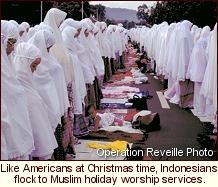
An American teacher in Indonesia reports that this past year's celebration of the end of the fast month was one of the saddest and poorest ever. Imagine having to celebrate Christmas without funds for parties, presents, and travel. After the holiday, Indonesia's flagship English language newspaper, the Jakarta Post, reported, "Indonesia Marks Idul Fitri with Anguish and Simplicity."
It's not just economic hardship that's disrupting the national spirit, but a growing awareness that Indonesia's predicament has roots in Islam. Besides the attack in Bali that virtually shut down its lucrative tourism industry, extremists punctuated Islam's highest holy day by blowing up a McDonald's in a provincial capital. The same Jakarta Post article reported, "The October 12 Bali terror attacks that claimed almost 200 people, along with the bomb blast in Makassar, have been a slap in Islam's face for many here, as the prime suspects are all Indonesian Muslims." At one holiday service the preacher, who'd lost relatives in the Bali bombing, reportedly cried through most of his sermon.
Muslims generally know what to do when their religion is insulted. They get upset, throw fits, and instigate riots, but with this "slap in the face" coming from the country's most conservative Muslims, many Indonesians are becoming disenchanted with Islam.
Carl Cady, U.S. Director for International Friends of Compassion, has spoken to pastors in central Java who report that many Muslims are secretly attending churches. These are saying, "If running into buildings and killing innocent people is what Islam is all about, we don't want anything to do with it."
Many Muslim leaders are trying to disassociate Islam from this kind of extremism. A lot of holiday sermons encouraged Muslims to do good deeds, nurture brotherhood with people of other religions, and avoid activities that would bring shame upon Islam. A devout 70-year-old man living down the street from a friend of mine in Indonesia said, "It's the first time I've ever heard them preaching what I've always believed -- that we should be friends with people of other religions."
Just like most Americans claim to be Christians, but the majority of these rarely if ever go to church, so the majority of Indonesia's 170 million nationally registered Muslims are not registered with local mosques and do not regularly attend religious services. Indonesia's economic and religious future will depend upon the courage, influence, and direction taken by this moderate majority.
Book Review:
The Sword of the Prophet: The Politically Incorrect Guide to Islam
reviewed by Rick Bailey
 In this 300 page book, Serge Trifkovic uncompromisingly describes core motivations and goals that should make any non-Muslim shudder. His approach is primarily historical, though he also treats Islam's theological foundations. Serge is rather like a non-Jewish version of Daniel Pipes.
In this 300 page book, Serge Trifkovic uncompromisingly describes core motivations and goals that should make any non-Muslim shudder. His approach is primarily historical, though he also treats Islam's theological foundations. Serge is rather like a non-Jewish version of Daniel Pipes.
The first four chapters convincingly show that 9-11, rather than being an aberration of 'a noble religion,' is typical of the historical record of the practices and teachings of mainstream Islam. In light of this, the second to last chapter ('Western Appeasement') discusses the West's recent relationship with Islam. This chapter shows how the level of trouble we are presently experiencing with Islam is, to a very large degree, the result of poor choices made by the West over the past half a century. In the last chapter ('Jihad's Fifth Column') the author exposes the true nature of the kind of Islam that is presently penetrating the West. If unchecked, Serge leaves little doubt it will eventually force undesirable changes upon our whole way of life.
Serge does not just describe; he also suggests a way out of the present mess. At the foundational level, Serge believes a change in worldview is needed. He believes that the consequences of a continued allegiance to secularism will be devastating. Islam, he suggests, shows every sign of being more than a match for a secular, pluralistic society. The best response, Serge believes, is to return to our Christian roots. Only when our society can talk of 'God' in a public and meaningful way, will we be able to adequately respond to orthodox Islam.
"Before its self-destructive civil war of 1914-1918, the Christian world was as sharply defined as the Muslim world. Both were perfectly capable of defining themselves against each other in a cultural sense, and keeping their tolerations and rejections in useful order. What secularism has done, since replacing Christianity as the guiding light of 'the West,' is to cast aside any idea of a distinctly 'Western' social, geographic, and cultural space that should be protected. This was obvious in Europe by the early 1960s, and for the past quarter-century, at least, it has become obvious in the United States. Patriotism rekindled after September 11 is a reminder that at the grass-roots level the capacity for instinctive self-definition is still alive, but it cannot be sustained if the dominant outlook is that of cultural relativism and anti-historicism" (Introduction).
At the practical level, Serge provides several examples of what he believes should be done. His solutions include:
- ending orthodox Muslim immigration into the West
- demanding Muslims not be allowed to build mosques or proselytize in the West unless we are also allowed to build churches and proselytize among them
- expelling any Muslim (possibly including citizens) who believes in physical jihad, or in establishing Shari'a law. Serge does not appear to believe that it is possible for a practicing orthodox Muslim, in good conscience, to be a citizen of the United States
- seriously developing alternative energy and ending dependence on Muslim oil.
Serge clearly believes Islam presents as serious a threat to freedom in the West, and the world, as the Nazis and Communists. Just as in the cold war, Serge says that the West must practice a form of isolationism towards Muslim countries, and a degree of intolerance towards the religion of Islam. The reason for this intolerance by the West towards Muslims is their doing, not ours.
"Islam, in Muhammad's texts and its codification, discriminates against us. It is extremely offensive. Those who submit to that faith must solve the problem they set themselves. Islam discriminates against all 'unbelievers.' Until the petrodollars support a Koranic revisionism that does not, we should go for it with whips and scorpions, hammer and tongs. Secularists and believers of all other faiths must act together before it is too late" (Conclusion).
Serge does not lose sight of the individual Muslim. He agrees with Ernest Renan that "Muslims are the first victims of Islam" and that, therefore, "to liberate the Muslim from his religion is the best service that one can render him."
One of the things I like most about the book is that it is a political book about how to respond to Islam that includes a role for Christianity. As Evangelicals steeped in salvation as an individual decision, and committed to separation of church and state, we tend to struggle with the political side of Islam. This book questions whether it is possible to continue separating church and state when orthodox Islam and Christianity meet. If this view is correct, Christians in the West have three choices: playing politics against Islam, expelling orthodox Islam, or capitulating and letting Islam take over.
If we change nothing in our present response (or lack of response) to orthodox Islam's advances, the most likely consequence will be that Islam will eventually take over the West. As Christians, we should not lose sight of how bad it can get for us, and all other non-Muslims, under Islamic rule. Would anyone like to volunteer a Christian answer to whether we should submit to a government that requires us to give some of our children to the state in order to maintain the right to remain Christian? Should we submit to such a state knowing that those children taken by the state would be raised as Muslim soldiers whose job would be to repress us? This 'Christian tax,' practiced in the Balkans for about 300 years (75 years longer than the United States has existed as a nation), must, contrary to Muslim wishes, never be forgotten.
My criticisms of the book are:
- As bad as it can be, I think Serge overemphasizes Islam's negative qualities. At times he fails to mention details that would make Muslim behavior more understandable. At times he is unfairly critical. Islam is not 100 percent bad. After reading this book you would think that it was. In fairness to the author, he is trying to make a case against the misdirection of present trends. As such it is not surprising that he should focus exclusively on the points that favor his side of the argument.
- It is not a missionary book. While addressing the religious dimension of how to respond, the positive Christian motivations of love and concern for the welfare of Muslims are not as clearly emphasized as they should be. At times it borders on creating irrational fear and hatred of Muslims.
Area Profile:
Load Acrobat version of this profile.
Spiritual Landscape of North Korea
condensed from the North Korea Investigative Report at www.nkmissions.com The original report features testimonies as well as audio and video of North Korean refugees and mission workers.
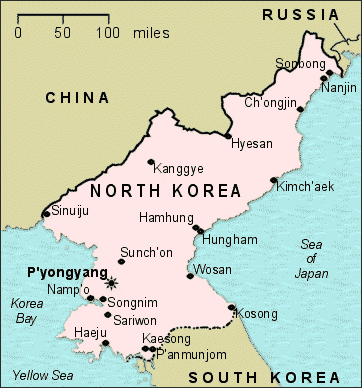
Little is known about North Korea. This small country of 22 million may be the most secluded and mysterious nation in the world. With intolerable living conditions, people are escaping to China to find money, food and clothing. Each day hundreds cross the Tumen River. These tell stories of millions who are perishing and suffering in the land of a ruthless regime.
Famine in North Korea has claimed two to five million since the mid-1990s. That's more than the famines in Ethiopia and Somalia combined. Refugees report that at the height of the famine in 1997, there weren't enough coffins for all the dead. Trucks drove through the villages every morning to pick up bodies on the streets. People ate grass and tree bark. Malnutrition made many children blind. Nearly every refugee has personal accounts of people eating other people.
In the 1940s, Christianity grew tremendously on the peninsula, especially in the northern half. According to some estimates, in1950 North Korea had 2,850 churches, 700 pastors, and 300,000 Christians. Pyongyang was called the "New Jerusalem."
At the end of World War II Kim Il Sung rose to power. He outlawed all religion. Thousands fled south.
Interviewed refugees relate no concept of God or religion. They were taught in school that there's no such thing as God. They had never heard of Jesus. They had no concept of life after death. They believe that once people die that's the end. Interviewed refugees didn't know how to pray, and didn't even know what prayer was. One refugee said he saw people praying in a movie on North Korean TV, but didn't understand what they were doing.
The state indoctrinates North Koreans in the Juche philosophy. Instead of the Holy Trinity of Father, Son and Holy Spirit, people are taught a trinity that includes Kim Il Sung, his mother Kim Jung Sook and his son Kim Jong Il. The written style of national laws resembles the law of Moses. One refugee who was learning about the Bible for the first time said he had an easier time understanding the Old Testament than the New Testament. Children give thanks to Kim Il Sung and Kim Jong Il for their food. Photos of these leaders adorn walls to remind people of who supposedly cares and provides.
Refugees report that merely saying that you're Christian results in immediate death. Two refugees took personal Bibles back into North Korea from China. Back in their hometowns, they kept the Bibles hidden. Some children discovered one of the women with her Bible. She immediately disappeared, never to be heard from again.
North Korean defector Hwang Jang Yop, a former confidant of Kim Il Sung, said, "If someone really wanted to attend church, or declared allegiance to it, he would be shot within five minutes."
The government runs two official Christian churches in Pyongyang. These are for show. Hwang said, "Those that go there are state-ordered 'believers.'" Knowledge of underground churches is minimal. Some report rumors of "Christian guerrillas" hiding out in the mountains.
Despite deplorable conditions, starving refugees refuse to blame Kim Il Sung. Even after receiving food and clean clothes from relief workers the refugees will defend Kim Il Sung and get upset if relief workers speak ill of their "great" leader.
From childhood, North Koreans are indoctrinated that North Korea is the world's wealthiest and best country. They are taught that America causes their present hardships. They are also taught that the U.S. sends food and medicine as peace offerings. One refugee who had just finished obligatory army duty said that many believe war is inevitable to reunite the Korean peninsula, and all feel if it comes to war, the North will win. Even after seeing the truth, he remained steadfast in defending North Korea.
Refugees share that they constantly fear death. Many had seen or heard about people taken away in the middle of the night for watching a foreign television program, listening to a foreign radio station, criticizing Kim Il Sung or Kim Jong Il, or owning a Bible and praying. No one can talk against the government. People who complain are arrested and punished. People live in fear of one another and are never free to share their personal doubts.
Some Koreans reside in China. Some of these are Christians, and some of them are aiding North Koreans. These speak Korean and can sneak in and out of North Korea. They deliver food and medicine into North Korea and provide shelter for refugees who make it out to China. One grandmother in China uses six ID cards at different border crossing points to deliver food and supplies. Koreans who reside in China are allowed to visit relatives in North Korea once a year, but they cannot give humanitarian aid openly because that affronts North Korea's self sufficiency and pride.
When refugees go back to North Korea they tell their trusted relatives or friends what they've seen and heard. More and more North Koreans suspect that they are being tricked. Also, Christians in China are impacting North Koreans. Many refugees come out to China having been told by their friends to look for buildings with crosses on them because that's where they can receive help.
Resouce Contact Information
| The World Network for North Korea informs people and facilitates discussion, training and projects towards preparing church planting, Bible distribution, and relief and development teams for when North Korea opens. It also facilitates projects for creative ministry as long as North Korea remains closed. |
Resource:
CD-Rom on Islam and Christianity
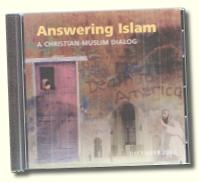
Has your faith been challenged by a Muslim friend? Are you struggling to explain the gospel? Are you curious about Islam, and do you desire to go beyond political correctness?
This CD-Rom of the Answering Islam web site has over 40,000 searchable pages with . . .
- Explanations of Christian doctrines
- Defense of Christian Scriptures
- Testimonies of former Muslims
Articles by many authors summarize and evaluate Islam. They challenge claims made by Muhammad, the Qur'an, and modern apologists, and discuss terrorism and the political nature of Islam. The CD even includes a collection of religious humor.
Some of the articles and testimonies are also written in Arabic, Chinese, French, German, Indonesian, Malay, Russian, and Turkish.
www.answering-islam.org/ordercd.html
questions@answering-islam.org
Good News for Muslims
P.O. Box 13132, Houston TX 77219
Resource:
Special Deal for Military on Audio-Visuals in Hundreds of Languages

Service members often get into places where missionaries cannot go.
A foundation in Canada is offering subsidized audio-visual gospel materials for outreach by believers within the military or their contacts. Keith Kline, an ex-U.S. Navy man, can help you choose the best materials in the appropriate languages and media formats for wherever you are going, and he can also give you some ideas for what to do with them.
JESUS videos are available in 800 languages. The Kid's JESUS video in 25. The God's Story (Bible Overview) video is in 50 languages, and audio tapes of the Bible are available in 420 languages. Other titles are available too. For bulk orders (minimum 25), prices go as low as $1.50 each for the JESUS video, and that can even include the cost of mailing!
e-mail: Keithk@idmail.com or StevensonGandB@aol.com (alternate)
Telephone: (604) 534-3183
Mailing Address: 3110 207A St., Langley, BC V2Z 2C5, CANADA
Resource:
Guide for Doing Evangelism on the Internet
This site is designed to equip Christians for using the Internet for evangelism.
Its ideas and resources can help you design and use web sites to reach out to friends and relatives as well as to touch the areas of the world where service members are hotly engaged.
Opportunity:
Help Persecuted Christians in Afghanistan
Christians in Afghanistan and Pakistan are often stripped of possessions and homes. Believers in the United
States can help to meet many simple needs through Voice of the Martyrs (VOM) with "Action Packs."
Each "Action Pack" includes:
- a special preprinted zip-lock bag
- instructions on what to put in the bag
- instructions for sending it through VOM
- materials to promote the program
To participate contact:
P.O. Box 443, Bartlesville, OK 74005
www.persecution.com/actionpacks.htm
1-800-747-0085
Opportunity:
Muslim Studies Training Programs for 2003
| Dates | Program-Course Name | Sponsor | Contact Info | Location | ||||||||||
|---|---|---|---|---|---|---|---|---|---|---|---|---|---|---|
| 29 May - 7 Jun | Summer Institute on Islam practical outreach training | Arab World Ministry | 1-800-447-3566 training@awm.org | Philadelphia, Pennsylvania | ||||||||||
| May & Jun | World Mission Center (one & two week short courses) | Southwestern Baptist Theological Seminary | 1-817-923-1921 KHicks@swbts.edu | Fort Worth, Texas | ||||||||||
| 28 Jun - 28 Jul | Summer Training and Outreach Program practical outreach training | CHRISTAR | 1-800-755-7955 paul@imi.org | New Jersey, NY metro area | ||||||||||
| 7 Jul - 1 Aug | Institute of Muslim Studies weekly short courses | Columbia Int'l University | 1-800-777-2227 muslimstudies@ciu.edu | Columbia, South Carolina | ||||||||||
| 7 Jul - 1 Aug | Summer Institute of Muslim Studies weekly short courses | Ministry to Muslims | 1-303-442-3333 www.horizonsinternational.org | Boulder, Colorado | ||||||||||
| June & July | School of World Mission weekly short courses | Fuller Theological Seminary | 1-800-235-2222 | Pasadena, California | ||||||||||
| 9-21 Jun | Sahara Challenge 2 week course and trip | Arab International Ministry | 1-888-446-5457 sahara@arabim.org | Indianapolis, Indiana | ||||||||||
| 28 Jun - 12 Jul | Quencing the Thirst 2 week trips overseas | Arab International Ministry | 1-888-446-5457 sahara@arabim.org | Overseas | ||||||||||
| 24 Jul - 4 Aug | Islamic Institute two week seminar | Assembly of God Theological Seminary | 1-417-866-3313 www.CMMequip.org | Springfield Missouri 7 Apr - 30 May
| Southeast Asia Institute | of Intercultural Studies SEAIIS
| seaiis@mail.com
| Singapore
| 3-4 Dec | Naaman Initiative | day long seminar Fellowship of Christian Military Ministries
| 1-719-572-5908 | naaman@oprev.org OCF Retreat Ctr, | WSS, PA |
Seminars and Workshops that Will Come to You
| Organization | Program | Contact |
|---|---|---|
| Ministry to Muslims | Introduction to Islam | 1-719-597-0609 |
| Zwemmer Inst. for Muslim Studies | Muslim Awareness Seminars | 1-219-452-2245 |
| Arab International Ministry | Sharing the Hope | 1-888-446-5457 aim7@indy.net |
| Operation Reveille | Missions Perspectives on the War on Terrorism | 1-719-572-5908 |
| The Navigators | lectures by Dr. Nabeel T. Jabbour | 1-719-578-8973 njabbour@bigfoot.com |
| Operation Mobilization, UK | Markaz Tehquiq Al-Haq | MTH@care4free.net |